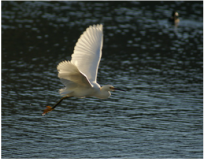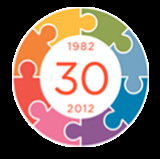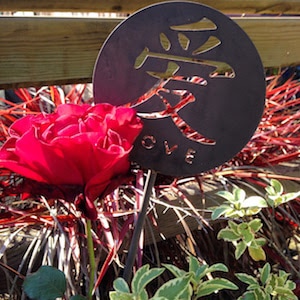 Five years ago, June bicycled and baked her way into hearts and libraries. The story of June and her two moms seemed perfect, published the year then President Barack Obama proclaimed his support for making same sex marriage legal. Then, three years later the Supreme Court made marriage legal for all. It seemed that love is love. And now we are here. A time when a child of immigrants tells me she knows the president hates her and wants her to leave the U.S. A time when sexists and supremacists openly hate. A time when LGBTQ people are fearfully and angrily watching their rights disappear. This November, I will be talking about June and My Mixed-Up Berry Blue Summer to thousands of educators, authors and publishers at the 2017 NCTE Annual Convention in St. Louis. I’ll be one of the authors on a panel on LGBTQ literature in the classroom, moderated by professor Paula Greathouse. The topic is more urgent than ever. We all have to find our inner June: to stand up to grown-up bullies even when we are afraid. To express our true selves, the way June does by baking her best wild berry pie. To try and understand each other, as June and her friend do. To stand together, the way June stands by her two moms. My Mixed-Up Berry Blue Summer is there on the shelves of libraries, among so many wonderful books written by authors who write with courage, heart and truth. I won’t give up on love and hope. 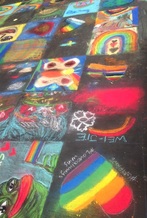 Wow! Friday, June 26 was a historic day. The Supreme Court made marriage open to all, in every state in the union. Like many others, I found that tears of joy came easily -- it was wonderful to see happy people and to know, at last, #lovewins. Walking around San Francisco, I saw rainbows on cheeks, rainbow flags flying, women with rainbow ties. And it was beautiful. I won't quote here the fabulous words spoken and written that day. Instead, I remember the friends I knew, fighting for dignity in the early 2000s, the couple I interviewed who wed in 2004 when California issued marriage licenses in defiance of a state ban, and the families going about the business of raising children, despite legal obstacles. Love wins, indeed. Gives you hope, doesn't it?  It’s been three years since My Mixed-Up Berry Blue Summer released, and you may be wondering, when is my next book coming out? The answer is not simple; I am in the canyon between books, climbing up now, foothold by foothold. Publishing at all these days, if you follow this field, is a strange and different experience for each author. What I can say is that for me, the writing process is as twisty as a live oak. It goes something like this: an idea begins in my heart, and my brain begins to put pieces together like a puzzle on a card table with a floor lamp pulled close to illuminate it. Yet there’s not quite enough light, so some of the pieces are in semidarkness. I do a little research online and at the library, saving newspaper articles and keeping a bibliography. I begin with an outline, and I always write three short sentences about what the main character WANTS, BUT, and THEN. I write down what the protagonist HOLDS DEAR and what she or he FEARS. (This is great advice from Kathi Appelt.) Sometimes I write short poems in the voice of several characters, so that I get inside their heads and hearts. And then one day I plunge in and begin to write. I start from the beginning, and I often spend too long on those first pages. When I reach the middle, I almost always lose steam. The plot doesn’t seem plausible, or something is wrong, or there’s not enough action. The story needs more conflict, more tension. (Janet Fox says it well.) That’s when I gather more research, or talk to writer friends, or take long walks and talk to myself. I make a recording of the plot, an awkward two-minute speech I save on my phone. This gets erased and redone several times. Every writer I know says the next stage comes, even though you think you can avoid it: major scenes or characters need to be thrown out. Some element is not working. As terrible as that sounds, it’s a relief when you see a way out, even though the only way out is to rewrite. Every writer learns that the story wins—and the goal is to write a story in which not one piece is jammed in. That’s where I am, and all I can do is keep on writing.
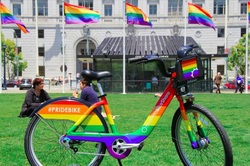 It’s easy to gush, “Oh, I’m so proud of you!” when a child brings home a good grade or behaves well at a restaurant or scores a winning goal. But what if we encouraged children to be proud of who they are, no matter if they fall outside the expected? It’s pride week, and the city near where I live, San Francisco, is getting ready. (I particularly like this Bay Area Bike Share bike!) And I’m reminded that Pride began in 1969, when the opposite of pride—shame—was once commonly felt by gays and lesbians. The gay rights movement has come so far since the Stonewall days. Attitudes are changing in the publishing world, too. I’m particularly proud of the #WeNeedDiverseBooks campaign, which has loudly, proudly demanded that booksellers and publishers and authors begin to look at which stories get published, what stories are purchased for our children. It’s vital that we have books that reflect the world today. For me, I will never forget reading books that introduced me to people different from myself. The stories I read--Roll of Thunder, Hear My Cry, Summer of My German Solder—built understanding and compassion for experiences other than mine. But when I was young, I never encountered a story about gay parents or young people questioning the happily ever after of boy-meets-girl. It wasn’t until I began writing My Mixed-Up Berry Blue Summer that I searched for these books. They started to appear in the late 1990s—the first was Annie on My Mind in 1982—but too few were for middle grade readers. (School Library Journal provides a list of recommended titles for ages 8 to 12.) Look how far we’ve come, now! Even two years after my book was published, the world is moving gay marriage to the mainstream (although we’re not there yet). Best of all, children can find more books at the library that will speak to them or their experience or their neighbor’s experience. (Thanks to Lee Wind for his exhaustive LGBTQ list!). And more diverse literature is not only good but essential for the future of our world. If you are a writer, remember to do as Gary Schneider asks: “Write the stories that will give kids more to be human beings with.” And fly your rainbow flag with pride! 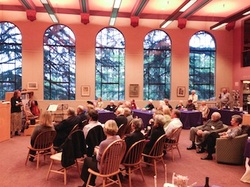 People who like libraries are my favorite people. For the shy and lonely, books are such good friends. I grew up in a suburb of Boston, and when I was 10 years old, my mother let me take the bus down Parker Street to Newton Corner, where there was a wonderful library in a park. I worked my way alphabetically through the children’s fiction. I’d leave the library balancing a stack of books as tall as I was old. Authors, of course, our biased toward libraries. Not only because it’s where we hope you will discover our work but where we find the stories that inspire us. Reading is essential to being a writer, to build vocabulary, to research, and to study plot, voice, and suspense. But we also just love to read! When I asked friends what they love about libraries, almost everyone wrote, with just a little wonder, that the books are free. A writer friend says: “You don't need a dime to enjoy the library. All you need is some time and a desire to make your world a little bigger.” And a cousin said, “A public library is one of the few places in some parts of the country where you can go, knowing you will be sharing space with other souls who love books.” That’s what libraries deliver that a download can’t: community. Yes, we could have print and digital books delivered directly to us but we’d miss the chance of seeing each other. Here, you might end up chatting over there in the 900s with someone about your next trip to Vancouver or Amsterdam or you might find yourself recommending the latest Sherman Alexie or Sharon Creech as you browse the new books section. On other days, we come to the library not for conversation but to be alone in community. We’ve got our headphones on, our laptops open or magazines unfurled in our hands. There is something lovely about sitting with other people who are focused and filled with the intention of being quiet. It’s nearly as close as we get to silence in this world today. That’s the thing about a third place that’s not home or work—serendipity. We don’t know what we’ll read when we wander in to the library, and we have librarians to thank for curating what’s here, selecting the titles that deserve a wider audience. The more we open ourselves up to new ideas—even ones we disagree with—the more we are likely to fuel the creation of our best selves. The stories in books connect us, filling our reservoirs of compassion, chipping away at our isolation. What is important is libraries exist where we can—for free—borrow books. 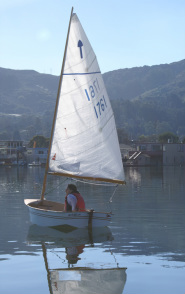 This year I am writing daily in a journal. My subject: water. I chose water because I love everything about it -- swimming in it, sailing and kayaking on it, drinking it with a lemon slice, hearing it dive against the windows in a storm. And I've loved many bodies of water, from Crystal Lake to Lake Champlain to Richardson Bay, where I live now. I figured I couldn't possibly run out of ideas, even if I'm aiming for 365 entries. I'm calling it my #dailywaterlog. Why am I limiting myself to water when I could just as easily write about the book I'm working on or ideas for new ones or about the ups and downs of the author's journey? The reason is simple. The act of writing daily is a discovery and a practice. One day I know exactly what I want to write and the next I'm stumbling around. But every time I say, OK, write for just five minutes, I'm surprised by where I go. I've written about the water I'm served at a restaurant ("My gratitude for fresh potable water I kept to myself") to the Guppy, our small sailboat that you have to sit on the bottom ("I can feel the cold sea and the slap of the hull on the waves") to my ferry commute ("white petal of gull/catches the eye/cormorant dives/by the ferry port"). Choosing to focus on one topic is good practice, too. Repeating a question is a technique Buddhists use to unearth thoughts and feelings. How will I answer the question of water by the end of this year? Each day I will be stretching to observe more, to be curious, to investigate my response to this one prompt. 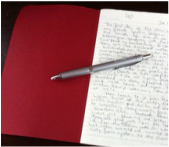 Pen and paper My daily water log is not here. Why? Like many of us, I spend too much time online. At work, I've got two screens, and on my way to work I scroll through my mobile screen, and then on the sofa I've got my screen on my lap. The daily act of running my pen across a paper page brings me back to my childhood, back to when I couldn't stop writing. Another benefit: I'm free to write bad sentences. My daily water log is free of any pressure to produce publishable work. It is a place to get back to the root of why I write: to record the human experience on this beautiful planet. 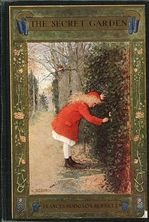 Sometimes I wish I could read The Secret Garden for the first time again, find the key, hear that scary sound in the night. To be ten again, and meet Dickon and nurture those roses into blooming as if I don't know what's coming. I was fortunate, though, to read an old classic for the first time. Gone Away Lake by Elizabeth Enright (a 1958 Newbery Honor book) was a lovely surprise. Beautiful writing never goes out of style! The main character, Portia, has just arrived at the summer house where she and her brother stay, and she picks up Fatly the cat to greet him. "He was just as soft and limp as somebody's old fur piece, and all his paws hung down like empty socks." What's funny is what happened when I reread Five on a Treasure Island by Enid Blyton (1942) I loved this as a kid but this time through, I was really struck by some of the preachiness. I admired George so much as a child, and I must have glossed over the references to how her cousins were civilizing her and teaching her to be better humored! The pacing was so different in both of these books. Compared to today's stories, Gone Away Lake was positively glacial. And yet, and yet, I did keep turning the pages. Now the Famous Five adventure--that was packed with suspense, bad guys, and clever solutions. There are many new children's books that are just as adventurous. I particularly like Sharon Creech's the Great Unexpected and When You Reach Me by Rebecca Stead. What are your favorite adventure books? 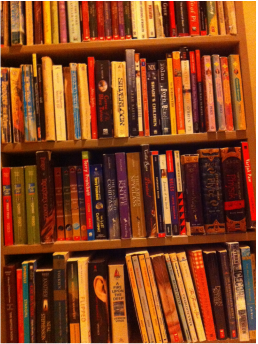 Ever get to that point when your critical voice makes you back space over every sentence as soon as it is written down? Or you've just run out of ideas? When writing time is scarce, I sometimes even berate myself for reading instead of writing. As if reading is procrastinating. In fact, reading is the best way to recharge. Why? The first reason most people already know: reading great writers builds vocabulary and reveals technique. I read other people's fiction and notice things like plotting, voice, or suspense. Francine Prose in Reading Like a Writer reminds me to go deeper: "All the elements of good writing depend on the writer's skill in choosing one word instead of another." Slow down, she commands, and I do. The second reason is well-noted by other writers. When we take ourselves away from our work -- to exercise, to run errands, to read -- the puzzles that stump us suddenly get solved. New stimuli turn things around and an answer comes. The final nice reason to read other stuff is for research. I'm always surprised by how much learning something new gives me a fresh approach to a plot or character problem. All of these things help: talking with friends, observing people, reading nonfiction (and not a writing craft one!). So read! Newspapers, blogs, books, magazines! I've come to feel that you just can't be a writer in a vacuum. (George Saunders just said the same thing much more eloquently in a New York Times interview.) So, the next time you moan about not enough time, don't resent your obligations too much. The work we do among the congregation of humanity is as necessary as solitude. Reading -- like conversation -- is just another way we encounter the material we need. 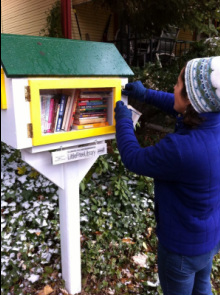 No surprise here: Everyone on my list is receiving books (again) this holiday. Thrillers, history, science fiction--every year it's wonderful to try and match people to books. I had a great time shopping at Book Passage (my local independent bookstore), perusing staff picks, holding the books, alighting on covers, reading the flap copy and the first sentences. Books are the best gifts in so many ways. For one thing, many of us already have too much stuff to warrant all the spending that happens at this time of year. To me, though, books don't count as stuff. The best of them give us new insight into what it means to be human, are even transformative. And you don't need to keep the book--I love to think of each one passed on to a friend or given to a school, or shared in a Little Free Library. If I could, I'd wrap up peace, love, and contentment. I'd give the bully and the bullied the gift of acceptance. And even though these things can't be delivered under a tree or tucked by the menorah, a book sometimes can inspire a better world. And money helps too.
|
The BlogHere's what I've been thinking and writing about. I love getting email, too! Archives
May 2017
Categories
All
|

